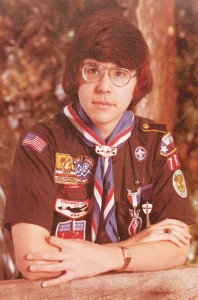
‘An Avowed Homosexual’
Openly gay Charles Spain has a long and illustrious history with the Boy Scouts of America. With the organization’s recent affirmation of their anti-LGBT stance, Spain discusses strategies for fighting the ban
by Megan Smith
As an Eagle Scout, former district scout executive, and father of a Cub Scout, Houston Associate Municipal Court Judge Charles Spain knows the Boy Scouts of America (BSA) inside and out. He’s also what the BSA would call “an avowed homosexual.”
This July, after review by a confidential special committee of top Scout leaders, the BSA reaffirmed their policy banning members of the LGBT community from participation in the organization, stating that it was “absolutely the best policy for the Boy Scouts.” For many participants in the program, including Spain, this decision meant losing their membership.

Courts previously ruled the organization’s policy permissible, as the BSA is a private organization. The reaffirmation sparked harsh criticism within the LGBT community and its allies, calling into question the program’s “private” status. The BSA has tight connections with the United States military, has access to federal land and personnel for their jamborees, and is lent supplies, equipment, and transportation for scouting events by the Secretary of Defense.
“The U.S. Supreme Court said, ‘Well, it’s free speech. They’re a private organization, they can do what they want,’” Spain says. “Whether the Boy Scouts of America is truly a private organization—I mean, the U.S. Supreme Court said yes, but that could have gone either way, like a lot of hard legal issues. There’s elements that I think you could argue aren’t true, but I don’t disagree with the opinion.”
Despite President Obama serving as honorary president of the BSA, a tradition for U.S. presidents, the White House released a statement saying that the president believes “the Boy Scouts is a valuable organization that has helped educate and build character in American boys for more than a century,” but that he “opposes discrimination in all forms, and as such opposes this policy that discriminates on the basis of sexual orientation.”
LGBT rights organizations, such as the Human Rights Campaign and GLAAD, have created campaigns to overturn the ban, while others are pulling their children out of the program. As for Spain, he’s taking a different approach. He continues to further engage the BSA by supporting his son’s membership, attending Cub Scout meetings, and doing programs for his son’s Scout pack. He says that he never receives any opposition to his involvement by other parents in the program, and some even express shared disapproval of the ban.
“I don’t agree with everything you do,” Spain says in response to the BSA, “but I’m still going to engage you. If you don’t want me, you’re going to have to get rid of me, because I’m going to show up. I believe strongly in the scouting program. I understand the program has to have an organizational structure; I was part of that organizational structure as a volunteer and as a paid employee. I don’t think the organizational structure of the Boy Scouts of America is evil. I don’t believe that at all, but I strongly disagree with them on some of their policies.”
Unlike many Eagle Scouts who have received recent attention for returning their badges, Spain will not be sending in his award. He refuses to let one policy change his experience with the organization, stressing that his Eagle Scout status even helped him get a job clerking for the Texas Supreme Court early in his career. “To the extent that they did it to get attention about what [we all] believe is an unjust policy, then I think more power to them,” he says. “Whether they like it or not, the statement is, ‘once an Eagle, always an Eagle.’ Whether they give their badges back or not, they’re still Eagle Scouts.”
As for his son, Spain asserts that the BSA presents a sense of normalcy and socialization that is greatly needed for young boys. He believes the program’s goal of instilling kindness, courteousness, and other core values outweighs the organization’s ban on LGBT membership. By teaching scouts how to work together and to share leadership, the program is providing boys with essential skills they will need later in life, Spain says. “Scouting is a game,” he states. “The point of the game is to instill values in kids and for them to learn by doing. The kids are the leaders, and in a good scout troop, the adults help the kids to lead and then stand back and let them do that.”
Spain recognizes that most of the values taught by the BSA lean toward the conservative side. However, he points out, the organization has historically been progressive on issues such as environmental concerns and women’s participation in the program.
Although he cannot, in good conscience, donate to the BSA because of their discriminatory policy, Spain shows his support for scouting by donating at the Baden-Powell Fellow level to the World Scout Foundation, which he describes as the United Nations of the scouting movement. Spain hopes that others recognize the BSA only controls scouting for boys in the United States and does not own the World Scout programming. The money he gives to the foundation does not trickle down to the BSA, but rather supports scout programming around the world, with an emphasis on scouting in developing nations.
Spain continues to work on overturning the ban by changing people’s minds through constructive conversation. While in Madrid for a meeting of the Baden-Powell Fellows, he had the opportunity to talk to Bob Mazzuca, chief scout executive of the Boy Scouts of America; Roy Williams, the immediate past chief scout executive; and Wayne Perry, current president of the BSA. Spain describes how everyone he spoke with at the meeting, despite their knowledge of his sexuality, was very respectful and created great dialog about scouting and kids. There was no argument about the policy among them, and Williams thanked him for supporting the program. “They didn’t have to do that,” Spain says. “They were being good Scouts.”
Spain is also trying to create change within the organization at the local level. He recently accompanied Houston GLBT Political Caucus president Noel Freeman to meet with Tom Varnell, Scout executive and president of the Sam Houston Area Council for the BSA. Spain and Freeman shared their experiences of growing up gay and how scouting positively affected their lives. Although a specific agreement was not reached, Spain points out that with the mainstreaming of gay culture, there is nowhere to move but forward. “I don’t like that I can’t register with the BSA, but I’ve got other things to do,” Spain says. “At some point, they’re going to change. This policy will end because they’re going to get left behind.”
Spain stresses that the best way to move forward is to combine the efforts of activists who are protesting the BSA and those, like himself, who are engaging the organization. He compares the current fight to the civil rights movement, which he believes would not have made such progress without both sides of the fight—Martin Luther King’s peaceful tactics, as well as Malcolm X’s more radical movement. “I’m sorry that it hurts people now,” Spain says, “but all of us who want this to change have got to do what we need to do to change it as fast as possible. My hat is off to the people who want to mail back their Eagle Scout badges. My hat is off to the people who want to protest with GLAAD and the Human Rights Campaign. That’s all fine, but it takes a village to convince the Boy Scouts of America that they need to change.”











Comments